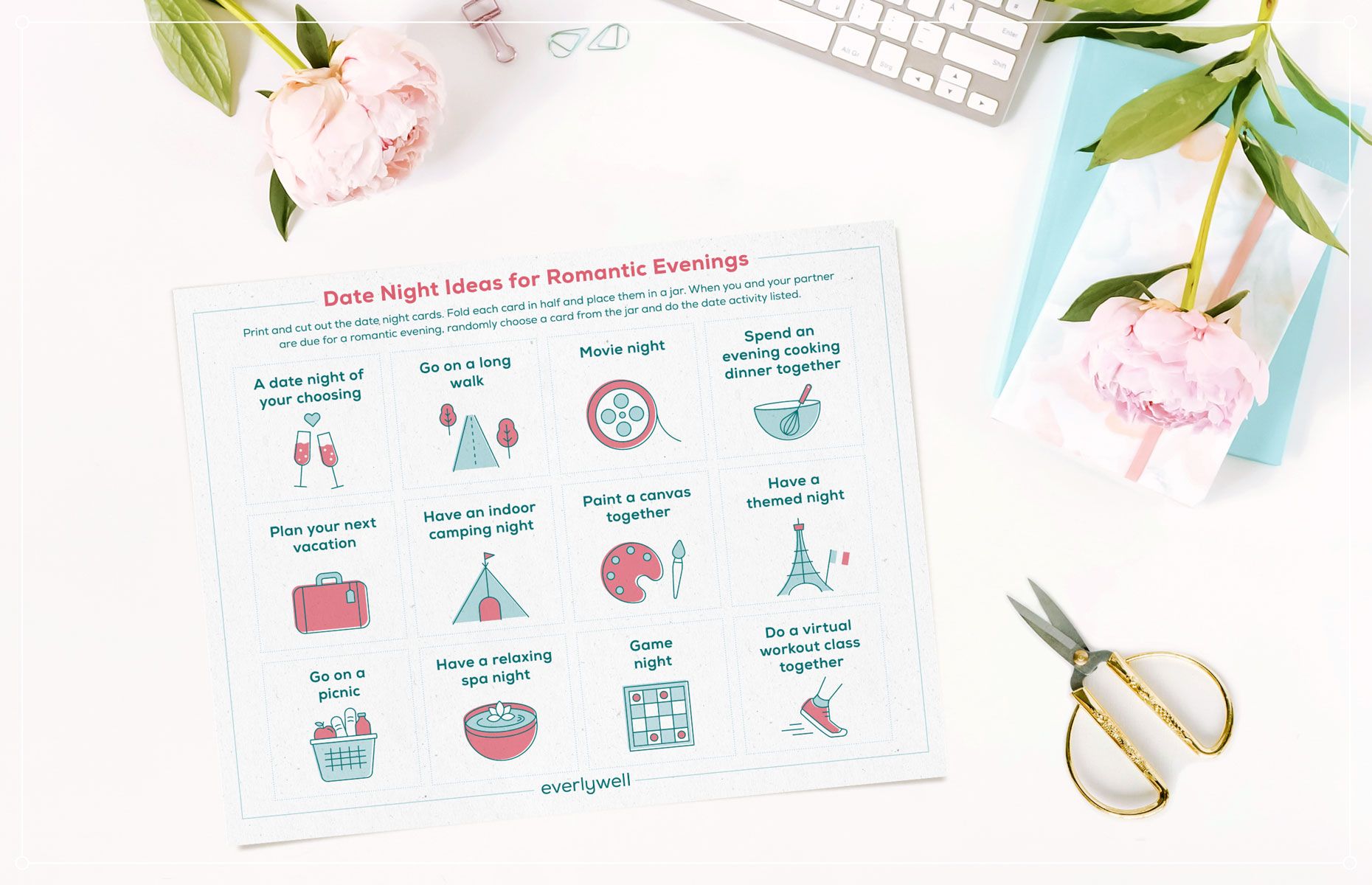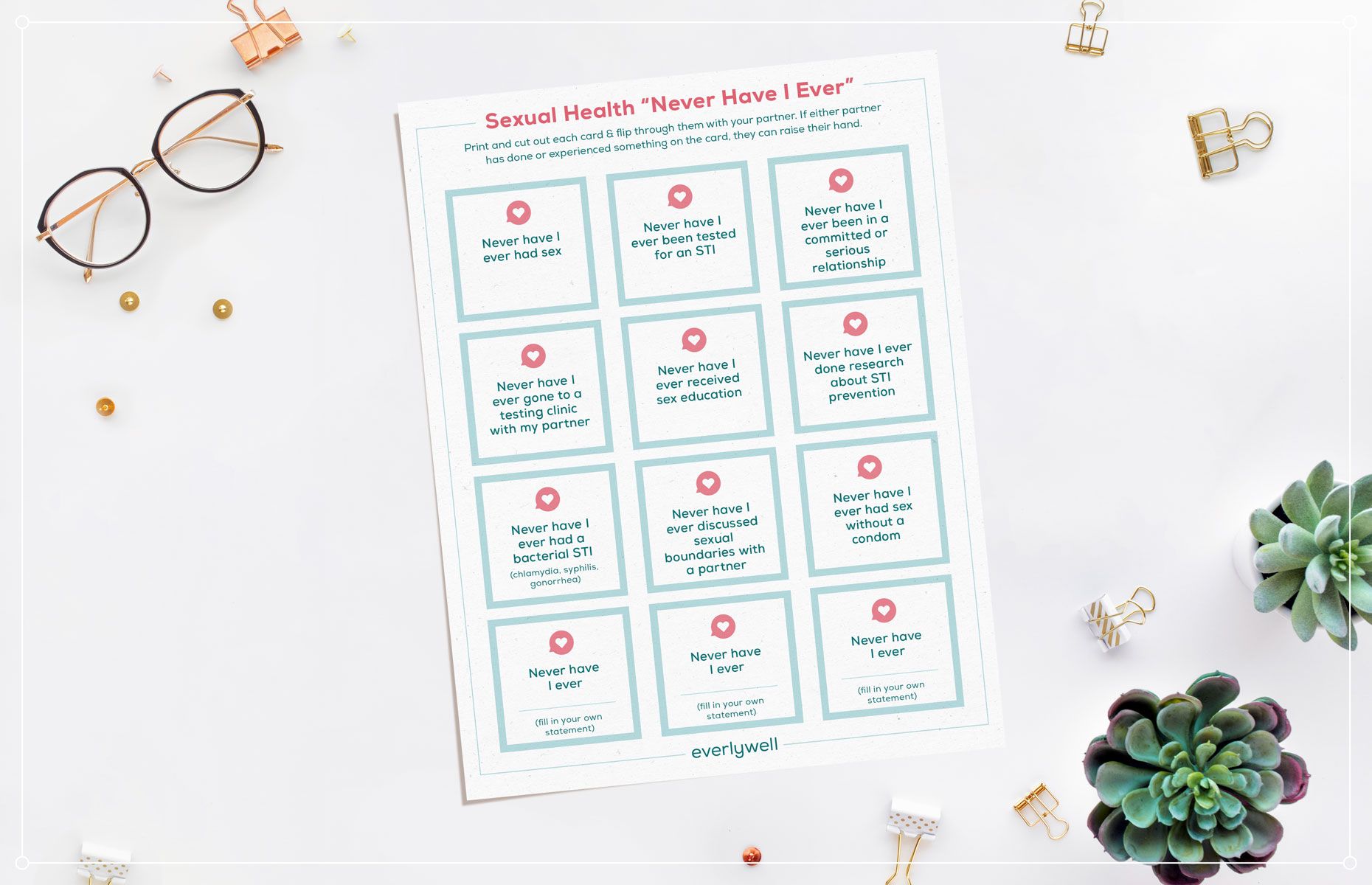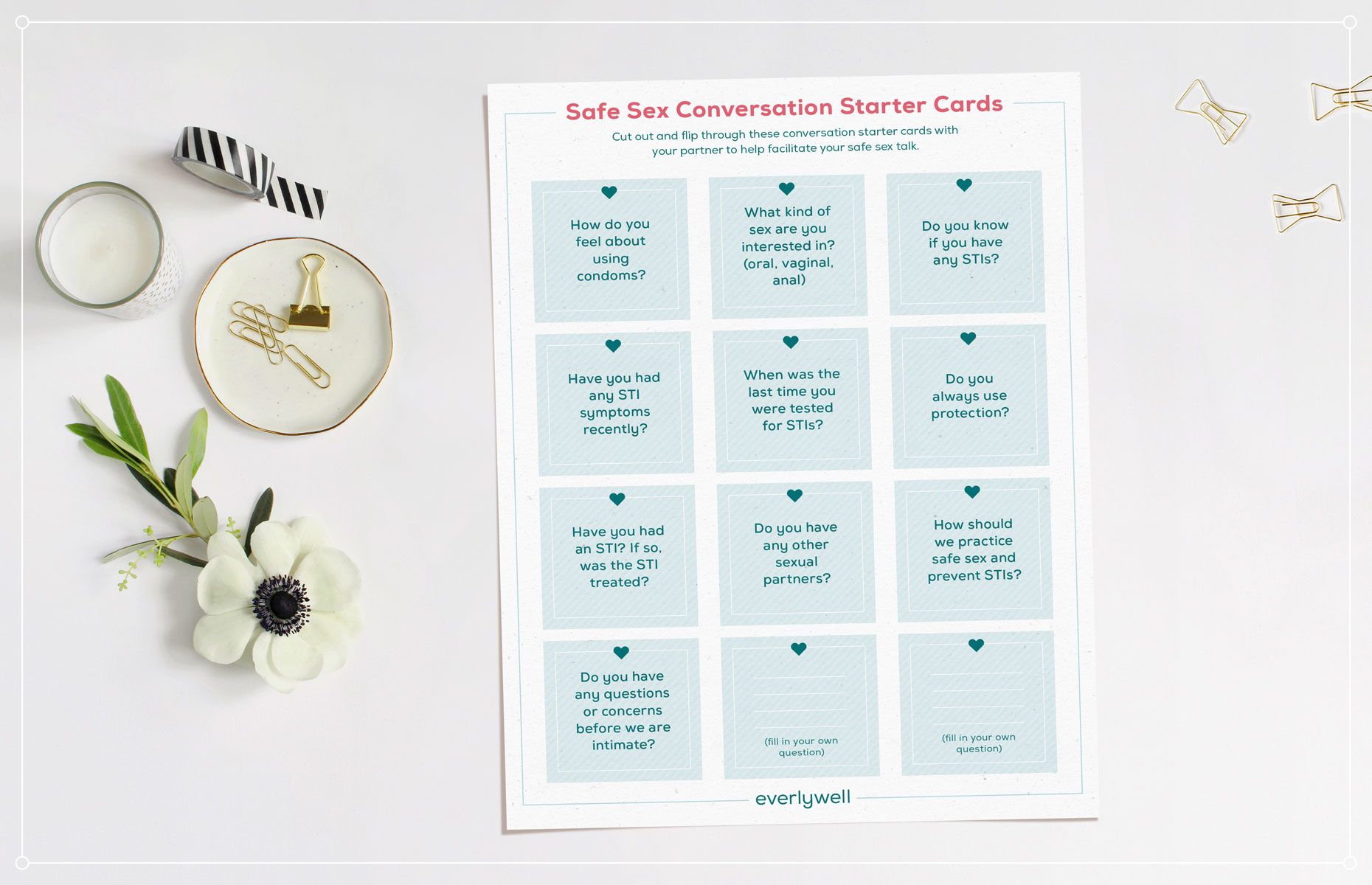
Let’s talk about safe sex: How to talk about STIs/STDs with a new partner
Table of contents
- 4 Tips for Getting the Conversation Started
- Common Questions When Discussing Sexual Health
- How to Discuss STI Test Results & Prevention
- Ideas for Romantic Evenings
- Related content
STIs/STDs are extremely common (“STI” refers to sexually transmitted infections, and “STD” stands for sexually transmitted disease). In fact, STIs/STDs cost the U.S. healthcare system approximately $16 billion each year. While not all people with sexually transmitted infections will have symptoms, STIs can have serious long-term consequences on your reproductive and overall health when left undiagnosed or unmanaged. If you’re planning on being sexually active with a partner, it’s important to discuss sexual health and how to practice safe sex first.
When you’re in a newer relationship, topics like STD testing and prevention may not feel like the most fun or comfortable to discuss—especially with all of the misinformation and stigma surrounding sexually transmitted infections. However, getting the conversation started can help both you and your partner maintain your health, limit the spread of sexually transmitted infections and diseases, and may give you peace of mind during intercourse.
So, how do you talk about STIs with a new partner? We’ve outlined a few tips to help you feel comfortable and get the most out of this conversation. Read on or skip to our printable conversation starters designed to help you and your partner open up about your sexual health and STI prevention.
4 Tips for Getting the Conversation Started

1. Know the Facts
With all of the misinformation and stigma that often encompasses STIs, it’s important to do your research and know the facts before having a conversation with your partner.
Remember, many people have STIs and have no or mild symptoms. Make sure you know how STIs can be spread and how to prevent them. Understanding how to get tested and what treatment options may look like should you or your partner have an STI, can also be helpful when having this conversation.
Discussion advice: Ask your partner how familiar they are with STD/STI prevention and if they feel prepared to discuss their sexual health. If there are gaps in sex education or understanding, consider doing research independently and then planning a “date night” to discuss what you’ve learned. You can even make it fun and quiz each other on sexual health facts or myths and see how much you know.
2. Identify Your Goals
Before diving into this intimate conversation with a partner, it may be helpful to identify exactly what you want to get out of the conversation. Think about why you’re having the conversation in the first place. For instance, are you having this discussion to let your partner know that you’ve been infected with an STI, or to get on the same page about how to practice safe sex? Figuring out exactly which topics you’d like to discuss beforehand can help you stay on track and ensure you don’t miss anything.
Discussion advice: Consider brainstorming and jotting down questions you’d like your partner to answer or what you want to accomplish from having this conversation. Jot down your own discussion points and go over them together.
3. Understand Your Boundaries
When it comes to intimacy and safe sex, you and your partner may have differing views or opinions. Make sure you stand firm in what you think is best for you and your health, and know what your boundaries or limitations are—even if you and your partner disagree.
Consider what you are and are not comfortable with during sex. When it comes to your body and your health, don’t compromise.
Discussion advice: When discussing your boundaries, be firm and direct. If something is non-negotiable for you or your health, make sure that is clear to your partner. Also, be prepared for not everything to go as planned. If something makes you uncomfortable or isn’t aligned with your values, and you decide not to be intimate with a potential partner, that’s okay too.
4. Create a Safe Environment
It’s normal to feel a little nervous or awkward when discussing sexual health, STIs, and protection for the first time with a partner. Aim to create a comfortable and safe environment for both of you to open up and get the most out of your conversation. This can be a very intimate conversation with your partner, so making each other feel safe and creating a space for openness is just as important before intercourse as it is during.
Discussion advice: Limiting distractions and finding a private setting where you both can feel comfortable to speak freely is best when discussing intimate matters such as your sexual health. Setting some ground rules like no phones, no judgment, or keeping whatever discussed between the two of you can be helpful as well.
Once you’re ready to have the safe sex talk with your partner, we’ve created a game of “Never Have I Ever” that you can play as an icebreaker and to learn more about your partner’s sexual health and boundaries.
Common Questions When Discussing Sexual Health

What Are Important Sexual Health Topics to Discuss?
Sexual health covers a variety of topics to protect your overall well-being in an intimate relationship. Important areas to consider discussing before having sexual intercourse with a partner include: contraception, pregnancy prevention, sexually transmitted infections, and sexual history. Here are a few ideas of questions to ask your partner:
- “Is it okay if we talk about a few things before we have sex?”
- “When was the last time you were tested for STIs and HIV?”
- “How are we going to practice safe sex?”
- “Are you okay with using condoms to prevent pregnancy and STIs?”
All of these can be useful to include in your sexual health conversation to ensure you are on the same page about safe sex and protection before being intimate for the first time.
Do I Need to Share My “Number”?
If you are comfortable with sharing your sexual history or how many sexual partners you’ve had, you can do so, but it’s not necessary. If you’d like to keep some things about your sexual life private, feel empowered to do so. The important thing is to make sure that you have been tested and know your sexual health status if you’ve had sexual activity with a previous sexual partner or partners.
If your sexual history is something you’d like to keep to yourself, consider saying the following:
- “I’ve been sexually active with other partners before, but my sexual past is something I’m not ready to share.”
- “I’ve had sexual partners before you; however, I practiced safe sex each time and was tested for STIs after.”
- "I’d like to keep my sexual past to myself, but…(fill in the blank)”
How Do I Ask My Partner to Get Tested for STIs?
It’s best to ask your partner to get tested for STIs before you are intimate. Remember, many people who have an STI don’t have any symptoms, and may not even know they have one. So, getting tested, understanding your sexual health status, and treating your STI if you test positive are some of the best ways to protect yourself and others from sexually transmitted infections.
Telling your partner that you want them to get tested because you care about both their health and your health is a great way to begin. You can even turn it into an activity and get tested together. Here are a few other ways to get the conversation started:
- “How do you feel about getting tested for STIs together before we have sex?”
- “I have good news! I got tested for STIs last month and didn’t test positive. When was the last time you were tested?”
- “I want to make sure we feel safe and have peace of mind during sex, so I think we should get tested for STIs before.”
For a private and easy way to get tested for STIs, consider taking an at-home STD test for men or women. (Related: at-home Chlamydia test for men and women)
To further help you and your partner get the conversation started about safe sex, we’ve created printable conversation starter cards that cover important topics when it comes to safe sex, STIs, and STI prevention.
Directions: Cut out and flip through these conversation starter cards with your partner to help facilitate your safe sex talk.
How to Discuss STI Test Results & Prevention

After you have been tested for STIs, you should share your results with your partner before having sex. It’s important to make each other feel supported when discussing STIs and test results.
If your results come back positive for an STI, make sure you understand your treatment options and share your treatment or STI management plan with your partner. This can help them have peace of mind and feel safe having sex once your treatment has been completed.
When discussing positive test results with your partner, it’s normal to feel a little uncomfortable; however, it’s important to be honest and straightforward. Make sure that they know you have discussed your test results with your healthcare provider and that you are taking all the necessary steps to make sure that you do not spread the infection. Here are a few ways to bring up STI test results with your partner:
- “It’s important to me that we are honest with each other, so I want to tell you that I was tested for STIs and it came back positive. I have chlamydia and am taking the prescribed medication. I’ll let you know when it’s safe to have sex.”
- “My test results came in and I do not have an STI. What did your test say?”
- “I’m glad I got tested because I found out I have a bacterial STI. I was shocked because I had no symptoms. The good news is that it can be easily treated with antibiotics.”
- “I’ve finished the treatment for the STI I had. Let’s talk about how we can both prevent STIs in the future.”
Once you and your partner have been tested for STIs, it’s important to discuss ways to prevent an STI in the future. Make sure you are on the same page about a prevention plan. You could discuss wearing condoms, vaccinations, getting tested regularly, and reducing sexual partners or being in a monogamous relationship to ensure you are both being safe during sex.
Ideas for Romantic Evenings
After having your discussion and establishing safe sex guidelines with your partner, reward yourselves with some couple time. Making time for each other can bring you closer together, and set the mood for an intimate evening with your partner.
Below are printable date idea cards that you can fold and place in a jar or basket. When you and your partner are due for some one-on-one time, randomly choose a date card from the jar and do the date activity listed.


The bottom line is that STIs/STDs are common and anyone who’s sexually active can get them. Having a clear and open discussion with your partner about safe sex before being intimate is one of the best ways to reduce your risk of infection. If you’re planning on being sexually active with a new partner, take an STD test to ensure you keep yourself and your partner safe from harmful or even life-threatening infections. For privacy and convenience, consider taking an at-home STD lab test for men or women.
If you are concerned about an STI or have questions about the best way to maintain sexual health, have a discussion with your healthcare provider.

Related content
4 safe sex practices to help avoid STDs
World Sexual Health Day: we surveyed how the pandemic changed our sex lives, even two years later



